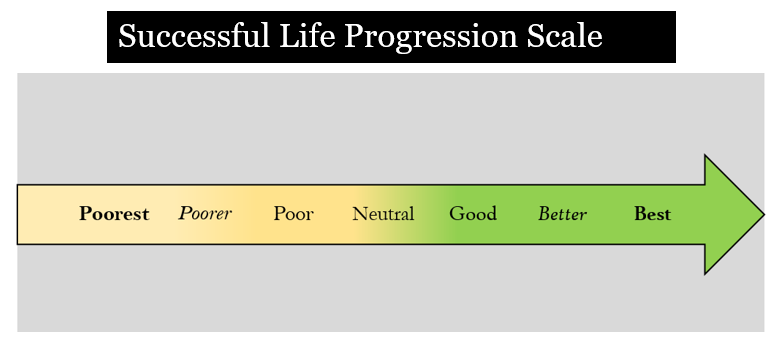
Hi! Welcome! Thanks for visiting. This blog is dedicated to those that have fought a lifetime battle for weight loss while managing the challenges of mental health issues and overcoming family trauma.
We can become both physically and mentally stuck at any point in our lives. Psst…we can even be stuck and not realize we are. When we are stuck at an unconscious level we may find ourselves lashing outwardly or internally with negative self-talk in very ordinary situations in what seems like for no apparent reason. If you find yourself in this situation you are living without adult sovereignty. Even in cases where there is more self-awareness of our “stuckness” on a conscious level, it still will not prevent the lashing out or inward from happening in the first place. Going back to my first post, The Takeback, and the graphic of the Successful Life Progression Scale that illustrates the internal and external healthy management of our triggers. You will most definitely slide right to left and vis versa on your path to a better you, so let’s move to the right on the scale to gain more adult sovereignty!

How Strong is your Emotional House Structure?
To begin to look at the current overall status of our emotional health and that of our level of adult adaptation to the world around us, it is material to look at our personal structural integrity in the same way we would look for at the structure of a building. When we assign the value of emotional health to a physical component of a buildings structure the bedrock of our home is support. Strong feelings of support from caregivers and family provide us with a healthy emotional adjustment to the world. By definition of support is to serve as a prop that does not give way. Considering the wide variety and types of materials that can be used as support when building a structure, a strong secure attachment from all sides makes for a safe and sound place of refuge, in this case an emotionally regulated individual. For example, when building any building, bricks are stronger then mud alone similarly it is best to build beach homes with a pier and beam foundation that are driven into the bedrock of the earth as opposed to building the home right on the sand.
As an adult the many trials and tribulations we experience serve to test the foundation our home was built on much in the same way weather does. Let’s examine a simple adverse scenario such as cancelled leisure plans that someone may experience like a cloudy and lightly raining day on our house. We will examine a person’s reaction from two perspectives: 1) from the “good enough” supported person’s perspective and 2) the poorly supported or unsupported person’s perspective. “Good enough” parenting/caregiving allows an individual to take appropriate precautions to weather the rain, but they know that the storm will pass. Conversely, when the parenting/caregiving is poor or unsupported the child and ultimately the adult will have strong feelings of abandonment, fear and hopelessness around even the smallest storms. These strong feelings of abandonment will arise from the lack of support you feel/felt from your caregivers because often times they fail(ed) to show up for you. The defining factors of support in this case could be when caregivers fail to physically show up to art, music, dance, sports, science or academic events that are important to you and or also could be deficient in providing emotional support for a venture you would like to take on.
Can your building weather the storm?
We will now fast forward a decade, or two or more and you are living on you own as an adult. At the beginning of the week you make plans to go out with a new friend to a free concert at a local park. On the day of the show, an hour before you are set to meet with this new friend they call up or text to let you know that they can’t make it. Understandably, there are feelings of disappointment, but these feelings place us at the intersection of our emotions and our response reaction. Going back to our childhood and the level of support we felt we received will play a hefty role in how we cope with the disappointing news. Our abandonment levels are interconnected to our internal dialog. Depending on our level of abandonment our self-talk will sound very different over the next minutes, hours, weeks or even longer in how we experience/weather our response reaction.
Examples of internal dialog for: In “good enough” parenting/caregiving: The internal conversation a person may have with themselves is this:
- That’s unfortunate we couldn’t connect for a night out, but that’s ok we will try again soon.
- I’ll check some local websites and or newspapers to find a different concert event we can check out
- Going to concerts are fun but there are plenty of other outings we could go to like trivia, sporting events, museums or grabbing food a new place or at a food truck.
- Maybe we can bond over a shared hobby
In poor parental/caregiver support resulting in medium-high levels of abandonment: The internal conversation a person may have is:
- They don’t like me and never really wanted to go with me
- I am embarrassment to be around because I am too thin, to fat, my hair is weird, I dress funny, I do or don’t have tattoos or piercings or any other superficial reason
- My taste in music is weird
- No one likes me and I don’t know why they would want to be friends with me
- I should have not put myself out there to ask this person to go to the concert. I am not going to do that again
- They think I am cheap because I wanted to go to a free show
- I don’t need anyone else I am fine, even if I am lonely
Reviewing the internal dialog for both individuals it is not hard to see that the actions for each of these people will be drastically different in how they will operate in the world after the cloudy and light rainy weather.
Amidst low levels of abandonment, a person can more quickly move on in a time appropriate and healthy way by perhaps calling another friend to go or even go by themselves to enjoy the show or spending time doing another activity that they enjoy. The principal factor that supported individuals have is that they will not allow this “negative” event to cause themselves to proverbially take their toys and go home to either have a temper tantrum or be depressed to the point of inaction for any significant period of time. On the other hand, when we struggle with abandonment, we will often have the later reaction resulting in various levels of emotional dysregulation, prolonged depression/anxiety and or use maladaptive coping mechanism to deal with the feelings we are not trying to feel. What is worse, is that instances of abandonment only compile over each experience leaving the person feeling like they are living in a smaller and smaller scarier and unsafe world to navigate in leading to profound feelings of being stuck.
Building Improvements
You must be asking yourself if you have read this far, “I am stuck or I think I am stuck, but how do I become unstuck”? From personal experience I can testify that, the length of time which we stay stuck is directly related to the tools we have in our coping toolshed. When we only have a hammer in our tool chest to fix problems, while a great tool it is not the tool to fix everything that is broken. Needless to say, the more tools we have to use the “faster” we can become unstuck. Some perfect examples of how despite what could be categorized as extreme “stuckness” are those individuals with extreme disabilities that go on to make meaningful and important contributions to the word and overcome their “stuckness”. Some examples are actor Leonardo DiCaprio suffering from obsessive- compulsive disorder, theoretical physicist Stephen Hawking, artist Frida Kahlo, founder Life Without Limbs Nick Vujicic, music recording artist Lady Gaga suffering from PTSD, wheelchair skater Aaron Fotheringham, artist and co-producer Sue Austin and wheelchair tennis parathlete Ester Vegeer
Sue Austin’s Creating the Spectacle!
Nick Vujicic – Never Give Up, Just be Yourself
How do you experience self-sovereignty?
What is an activity or passion you could take up to feel less stuck and provides you with self-sovereignty? Please share your activity and or passion in the comments below. For me, knitting is a source of self-sovereignty because it allows me to creatively add something to the world that was not their before while representing uniqueness as no two hand knitted items are exactly the same. The importance of recognizing and seeking out activities which bring us true enjoyment in our lives is immeasurable, in that it allows us to show up and be present in the world for ourselves often in ways our caregivers never did.